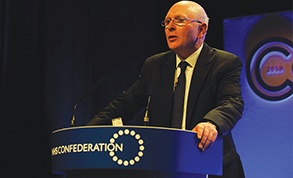Funding welcomed, but concerns remain
The financial arrangements covering the period from 1 October 2020 to 31 March 2021 were announced in guidance earlier this week, setting funding envelopes at system level. NHS England and NHS Improvement said the funding is enough for local areas to meet activity targets set out in the guidance on the phase 3 response to Covid-19. Systems will be expected to break even overall, though there will be flexibility within systems for individual organisations to make deficits or surpluses.
NHS Providers chief executive Chris Hopson (pictured) said there was relief that the funding had been announced. However, there were four areas of concern he expected trusts to raise. First, the guidance made ‘ambitious assumptions’ about recovering non-NHS income. The guidance expects non-NHS income to return to 2019/20 levels, except for NHS car park income (parking for staff is free during the pandemic). Mr Hopson said this would be a significant issue for some trusts.
Second, a further wave of Covid could hit some areas harder than others, he added, increasing some trusts’ costs more than others. NHS Providers wants assurances on emergency finance processes if costs are not covered by system funding.
Third, trusts want to be sure that only non-recurrent Covid-related costs that will be covered centrally, such as for the Nightingale hospitals, have been taken out of the system funding for the rest of the financial year.
And finally, trusts need details of the incentive scheme for hitting activity targets. ‘Trusts will want more detail on exactly how the claw back of allocations will work if ambitious service recovery targets are not met and what flexibility there will be if those targets are not met for good reason.
‘There is very good progress on restoring services and activity volumes – trusts are going faster than they expected a few months ago. But we still think the majority won't meet targets.’
The allocations look lower than expected, he added, and trusts will be working through the figures to understand all their income streams.
‘We understand NHS did not get all it asked for from Treasury and this will, by definition, affect the size of frontline allocations. NHS England and [NHS] Improvement tell us that what initially might look like a large financial gap will close once trusts have accounted for all their full sources of income and the costs that will now be covered nationally. But we obviously need to be sure this occurs.’
Mr Hopson warned that if the gap did not close, patient services, including service restoration and winter preparations, could be affected.
NHS Confederation chief executive Niall Dickson (pictured) said the service would welcome the greater certainty on funding and its distribution.‘For some time now, at the confederation we have been asking for greater clarity about funding and reimbursements and now we have it,' he said.
However, he added that the NHS was facing the winter with trepidation, not least because of the failure to establish an effective test and trace system. ‘From GP surgeries to the largest hospitals there is a feeling they are entering this battle with one hand tied behind their backs,’ he said.'Our members, the health leaders from across the NHS, will want to consider the detail but of course we are pleased that the additional cost of delivering services in the current conditions is included within these new allocations.’
Related content
We are excited to bring you a fun packed Eastern Branch Conference in 2025 over three days.
This event is for those that will benefit from an overview of costing in the NHS or those new to costing and will cover why we cost and the processes.